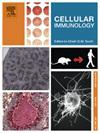靶向KRASG12D肿瘤新抗原的t细胞受体的功能增强
IF 2.9
4区 医学
Q2 CELL BIOLOGY
引用次数: 0
摘要
靶向新抗原的工程化T细胞受体(TCRs)代表了癌症免疫治疗的一种变革性方法,但其临床潜力受到天然TCR的低亲和力和过高亲和力的过度工程化TCRs脱靶毒性风险的限制。在这里,我们开发了一个TCR工程平台,以增强靶向KRASG12D突变(KRASG12D)的TCR的功能亲和性,同时避免对野生型(WT)肽的反应性。我们从HLA-A*11:01限制性krasg12d特异性TCR中分别构建了CDR3α-和cdr3 β-聚焦的TCR文库,并采用交替阳性和阴性选择对它们进行筛选:krasg12d脉冲抗原呈递细胞(APCs)驱动功能亲和度,而kraswt脉冲APCs消除交叉反应克隆。从这些文库中,我们发现CDR3α变体具有适度的贪婪增益和降低的脱靶反应性,CDR3β变体具有显著的贪婪增强和强大的肿瘤细胞毒性,尽管具有不同的交叉反应性。这种策略使新抗原特异性tcr的精确工程,平衡治疗效果和安全性的过继转移TCR-T治疗。本文章由计算机程序翻译,如有差异,请以英文原文为准。
Functional avidity enhancement of a T-cell receptor targeting the KRASG12D cancer neoantigen
Engineered T cell receptors (TCRs) targeting neoantigens represent a transformative approach in cancer immunotherapy, yet their clinical potential is limited by low natural TCR avidity and the risk of off-target toxicity from over-engineered TCRs with excessive high-affinity. Here, we developed a TCR engineering platform to enhance the functional avidity of a TCR targeting the KRAS G12D mutation (KRASG12D) while avoiding reactivity to the wild-type (WT) peptide. We separately constructed CDR3α- and CDR3β-focused TCR libraries derived from an HLA-A*11:01-restricted KRASG12D-specific TCR and screened them using alternating positive and negative selection: KRASG12D-pulsed antigen-presenting cells (APCs) drove functional avidity, while KRASWT-pulsed APCs eliminated cross-reactive clones. From these libraries, we identified CDR3α variants with modest avidity gains and reduced off-target reactivity, and CDR3β variants with significant avidity enhancement and potent tumor cytotoxicity, albeit with variable cross-reactivity profiles. This strategy enables precision engineering of neoantigen-specific TCRs, balancing therapeutic efficacy and safety for adoptive transfer TCR-T therapy.
求助全文
通过发布文献求助,成功后即可免费获取论文全文。
去求助
来源期刊

Cellular immunology
生物-免疫学
CiteScore
8.20
自引率
2.30%
发文量
102
审稿时长
30 days
期刊介绍:
Cellular Immunology publishes original investigations concerned with the immunological activities of cells in experimental or clinical situations. The scope of the journal encompasses the broad area of in vitro and in vivo studies of cellular immune responses. Purely clinical descriptive studies are not considered.
Research Areas include:
• Antigen receptor sites
• Autoimmunity
• Delayed-type hypersensitivity or cellular immunity
• Immunologic deficiency states and their reconstitution
• Immunologic surveillance and tumor immunity
• Immunomodulation
• Immunotherapy
• Lymphokines and cytokines
• Nonantibody immunity
• Parasite immunology
• Resistance to intracellular microbial and viral infection
• Thymus and lymphocyte immunobiology
• Transplantation immunology
• Tumor immunity.
 求助内容:
求助内容: 应助结果提醒方式:
应助结果提醒方式:


